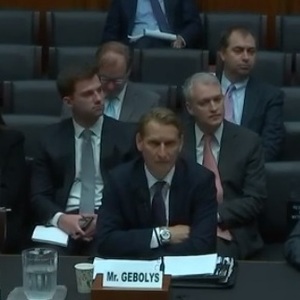Oil refinery exemptions cause crisis for biodiesel industry

October 29, 2019
BY The National Biodiesel Board
World Energy founder and CEO Gene Gebolys testified on behalf of the National Biodiesel Board at a hearing Oct. 29 on “Protecting the RFS: The Trump Administration’s Abuse of Secret Waivers” before the House Committee on Energy and Commerce’s Subcommittee on Environment and Climate Change. Gebolys told lawmakers that the EPA has many options to make up for the demand destruction from past Renewable Fuel Standard waivers and prevent harm going forward. Small refinery exemptions have destroyed demand for hundreds of millions of gallons of biomass-based diesel. At least nine biodiesel plants across the country have closed or cut production as a result, impacting hundreds of employees and thousands of jobs across the economy.
“When EPA finalizes its 2020 renewable fuel obligations rule by the end of this year, it must fully account for small refinery exemptions, or industry contraction and job losses will continue throughout the biofuels and broader agricultural economy,” Gebolys wrote in submitted testimony. “Moreover, the agency must recognize and support the biodiesel industry’s ability to grow under the RFS in 2020 and beyond, as Congress intended.”
Advertisement
Advertisement
World Energy owns and operates five biodiesel plants and a renewable diesel refinery—with total production capacity of more than 200 million gallons—and distribution hubs throughout the U.S. and Canada.
Gebolys testified that EPA could employ several different methods to properly account for small refinery exemptions in annual RFS rules.
“EPA should also move to prospectively grant or deny all small refinery exemptions for a calendar year before issuing the final RVO rule for that year,” he wrote in formal testimony. “This practice would allow all actual exemptions to be accounted for in EPA’s existing formula for calculating percentage standards and would enhance transparency for all market participants. EPA can and should require refiners to apply for exemptions with sufficient time to allow EPA to reach a decision by the Nov. 30 statutory deadline each year.”
Advertisement
Advertisement
NBB and its members support H.R. 3006, which would direct EPA to set an annual deadline for hardship petitions, as well as other legislative efforts to direct EPA to properly account for small refinery exemptions.
Gebolys’ testimony is available on the energy and commerce committee website.
Related Stories
The European Commission on July 18 announced its investigation into biodiesel imports from China is now complete and did not confirm the existence of fraud. The commission will take action, however, to address some systemic weaknesses it identified.
On July 18, U.S. EPA announced a reduction in force (RIF) as the agency continues its comprehensive restructuring efforts. With organizational improvements, EPA is delivering $748.8 million in savings.
The U.S EPA on July 17 released data showing more than 1.9 billion RINs were generated under the RFS during June, down 11% when compared to the same month of last year. Total RIN generation for the first half of 2025 reached 11.17 billion.
The U.S. EPA on July 17 published updated small refinery exemption (SRE) data, reporting that six new SRE petitions have been filed under the RFS during the past month. A total of 195 SRE petitions are now pending.
The USDA has announced it will delay opening the first quarterly grant application window for FY 2026 REAP funding. The agency cited both an application backlog and the need to disincentivize solar projects as reasons for the delay.
Upcoming Events










